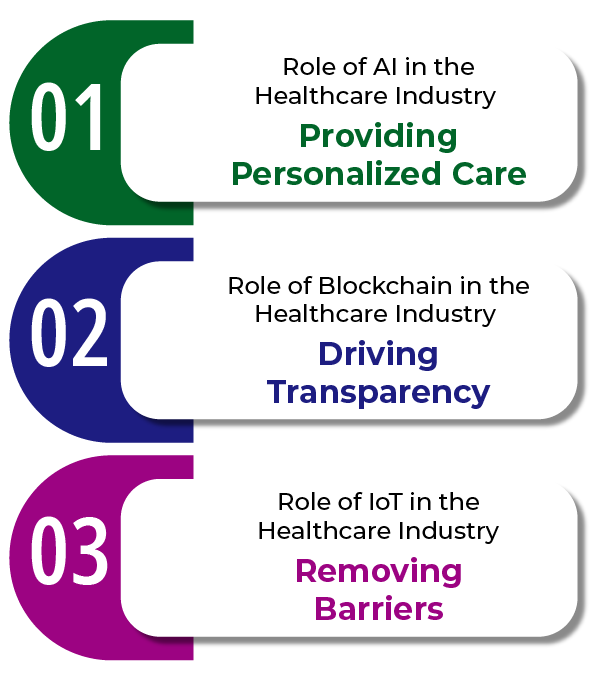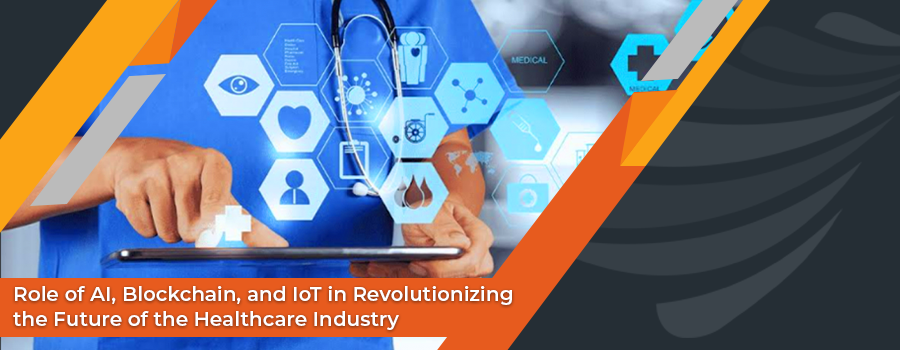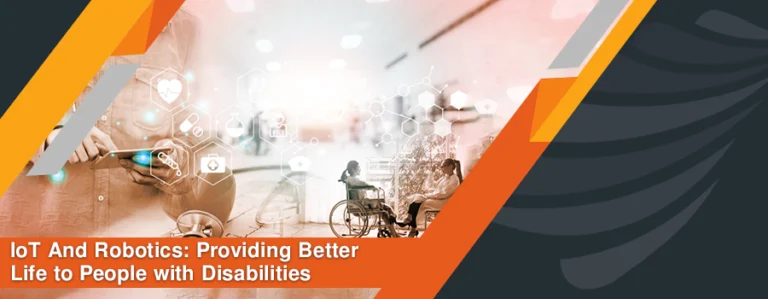The healthcare industry faces an increased risk of spreading disease, delayed diagnosis, wrong treatment procedures, and sudden and increased deaths. The main reasons for these risks we have identified are the long distance to hospitals, complex systems, lack of knowledge, and high costs. These challenges have specifically impacted disadvantaged and vulnerable populations. These issues highlight the need for the healthcare industry to revolutionize continuously.
The three emerging technologies major in transforming the healthcare industry are the Internet of Things (IoT), artificial intelligence (AI), and blockchain. Implementing these game-changing technologies provides real-time data, clinical data processing, connection with multiple devices and systems, correct predictions, and data analytics. It results in improved patient outcomes, care, accurate diagnosis, and treatment options and assists healthcare professionals in the best possible way.
This blog post will discuss the role of AI, blockchain, and IoT in the healthcare industry, future aspects, and challenges in implementation.

Role of AI in the Healthcare Industry: Providing Personalized Care
Since the 1950s, AI has been a part of medicine; physicians of that time made the first attempt to enhance diagnosis using computer-aided programs. Interest in AI has increased in recent years due to substantially advanced programs, algorithms, and huge amounts of digital data available for visualization and processing.
AI has huge applications in medical fields, including rehabilitation, surgery, clinical decision-making, diagnosis, and predictive practices. AI algorithms process and analyze big data and provide reports and predictions, helping clinicians make the right decisions. AI implementation also helps design new treatment options and drugs to provide advanced patient care and health services.
AI in the healthcare industry helps provide an early and correct diagnosis, personalized treatment, and care and automates different medical processes. All these implementations help improve patient outcomes and lifestyle and reduce costs linked with wrong diagnoses, long treatment procedures, and poor decision-making.
– Challenges of AI in the Healthcare Industry
To provide predictive analysis, AI needs a large amount of patient data, which raises concerns about risks of unauthorized access and breach of privacy and confidentiality of patients. AI results can be biased if there is an error in the data selection for presenting the entire population. It results in unproductive outcomes, financial loss, and high health risks.
Moreover, it is difficult to understand the process AI systems follow to reach specific decisions. It shows a lack of transparency, making it difficult for healthcare providers to trust AI-based results.
– Future of AI in the Healthcare Industry
AI adds value by automating and augmenting the work of staff and clinicians. It makes their work automated, which in turn helps to reduce errors and improve patient outcomes. AI-powered predictive health analysis helps to reduce waiting time, enhance staff workflow and minimize the burden on them. With the use of AI in clinical practices, healthcare professionals will remain updated with data analytics and can make better decisions. AI robotic automation can also completely revolutionize surgical procedures and rehabilitation, allowing people to live a better, healthy, and independent life.
Role of Blockchain in the Healthcare Industry: Driving Transparency
Blockchain technology has shown enormous applications in the healthcare industry. It saves and exchanges patient data through laboratories, hospitals, pharmacies, and multidisciplinary team members.
Healthcare professionals can visualize the data from different locations at one time. It allows them to enhance their decision-making and collaborate with the interdisciplinary team even if they are not physically present.
For medical institutions, it helps people to gain insight into information and enhance the process of analyzing medical records. Moreover, this technology accurately and efficiently identifies several complex errors and mistakes in the medical field. Consequently, it helps to strengthen the privacy, security, and transparency of sharing medical data in the healthcare system.
– Challenges of Blockchain in the Healthcare Industry
There are several challenges that the healthcare industry faces in implementing blockchain technology. The transaction time increases when the number of blocks grows, leading to delays. Another main challenge is it becomes impossible to delete recorded data permanently. The reason is the network creates more connected blocks, invalidating existing data. Also, potential issues occur while dealing with large and complex patient files such as CT and MRI scans. Besides, its implementation needs high planning and expertise and has a high maintenance cost.
– Future Aspects of Blockchain in the Healthcare Industry
Blockchain technology increases privacy and security in comparison to existing solutions. It offers secure encryption techniques to safeguard the integrity of individual information during communication. Encryption techniques and smart contracts are part of blockchain network transactions, reducing the process of pre-authorization and enabling patients to get required and informed care efficiently. One of the benefits of blockchain technology is healthcare providers gain access to relevant information quickly, eliminating the need to check emails to set physical appointments.
This technology may also facilitate the supply chain management of healthcare products, improvise medical research, and assist in clinical trials. With advanced implications and innovative applications, it will further revolutionize the healthcare industry.
Role of IoT in the Healthcare Industry: Removing Barriers
As a result of recent developments, IoT has revolutionized how we approach healthcare facilities. IoT devices collect health indicators such as blood pressure, heart rate, temperature, and other vital parameters of patients from anywhere they are present. It allows doctors to remain updated with the recent data of patients, provide virtual assistance and send emergency responses when needed.
IoT devices resolve the issue of record tracking, continuous patient monitoring, long-distance patient care, and providing emergency responses. Different wearable IoT devices offer opportunities for patients and doctors to remain connected and avail themselves of all the benefits.
The IoT implementations and related developments provide significant opportunities for the healthcare industry to effectively predict, treat, monitor, and diagnose patients’ health problems early. It allows the healthcare industry to offer flexible care models that meet patients’ needs. Furthermore, it automates patient care workflow by using advanced health mobility solutions.
Interoperability, machine-to-machine communication, virtual assistance, real-time data collection, and movement have made the medical field more productive. The increased dependency on web-based portals and mobile applications helps patients to monitor their records and consult with a doctor at the nearest possible time. Such integration saves the time of both patients and healthcare providers and also makes the process less expensive.
– Challenges of IoT in the Healthcare Industry
One of the major challenges of IoT in healthcare is privacy. All devices are connected, and data is transferred in real-time, increasing the risk of hacking, data breach, and data misuse. If the system is not secure, third parties can use this data illegally or for criminal activities.
– Future Aspects of IoT in the Healthcare Industry
In the future, we can predict that IoT implementation will cover all healthcare sectors. From prescribing medicines to providing emergency services and other health facilities, IoT will change the future of the healthcare industry.
Conclusion
The healthcare industry continuously faces challenges, including high costs, the complexity of systems, the risk of disease spread, and the long distance to reach hospitals. The industry has been revolutionizing with emerging technologies, including AI, blockchain, and IoT, to overcome these issues. AI provides personalized care and optimizes decision-making. On the other hand, blockchain technology enhances security, transparency, and privacy in data sharing. IoT technology enhances the connection between healthcare professionals and patients to provide care and emergency response even if they are far from the hospitals. However, there are challenges in their implementation, including the risk of bias in AI outcomes, unauthorized access to patient data, and long transaction time in the blockchain. We should overcome such challenges to ensure that the healthcare industry avails itself of the maximum benefits. With further advancements, such technological implementations will promote healthy living and contribute to smart city planning.





